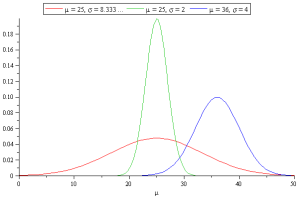Sigma
Sigma is the uncertainty around your skill rating, or Mu. New players are assigned a sigma of 25/3 (8.333...), and sigma tends towards zero until it settles to a value of approximately 1 after a few hundred games. The value of sigma is synonymous with the experience of a player. The lower your sigma, the more games you've played, and by implication the more experience you have. Until your sigma has stabilised, it will tend towards zero regardless of whether you've won or lost a game.
Low values for sigma lead to small changes being applied to your Mu, since the system is relatively confident that it has managed to settle on your true skill rating.
Sigma will decrease at varying rates depending on:
- The value of your sigma. The lower it's value, the more slowly it tends towards zero.
- The skill of the opposing team. Winning against a more skilled team will lead to a larger decrease in your sigma. Losing to a more skilled team will result in a smaller decrease to sigma.
Stablising sigma
By itself, Sigma would eventually decrease to zero. However
<math>\gamma = \frac{25}{300}</math> is the dynamics variable, which prevents sigma from ever reaching zero, which in turn determines how quickly mu can in/decrease once sigma has stabilised. If we discover that sigma-stabilised ratings are moving too slowly to reflect genuine changes in skill, we will increase gamma.
| AllegSkill |
|
|---|

